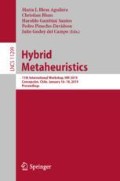Abstract
Construct, Merge, Solve & Adapt (CMSA) is a general hybrid metaheuristic for solving combinatorial optimization problems. At each iteration, CMSA (1) constructs feasible solutions to the tackled problem instance in a probabilistic way and (2) solves a reduced problem instance (if possible) to optimality. The construction of feasible solutions is hereby problem-specific, usually involving a fast greedy heuristic. The goal of this paper is to design a problem-agnostic CMSA variant whose exclusive input is an integer linear program (ILP). In order to reduce the complexity of this task, the current study is restricted to binary ILPs. In addition to a basic problem-agnostic CMSA variant, we also present an extended version that makes use of a constraint propagation engine for constructing solutions. The results show that our technique is able to match the upper bounds of the standalone application of CPLEX in the context of rather easy-to-solve instances, while it generally outperforms the standalone application of CPLEX in the context of hard instances. Moreover, the results indicate that the support of the constraint propagation engine is useful in the context of problems for which finding feasible solutions is rather difficult.
Access this chapter
Tax calculation will be finalised at checkout
Purchases are for personal use only
Notes
- 1.
In the context of problems that can be modelled as BIPs, any black-box ILP solver such as, for example, CPLEX can be used for this purpose.
- 2.
The used CP tool can be obtained at https://github.com/h-g-s/cprop.
- 3.
Note that, after fixing a value for \(x_{\pi (j)}\), the value of \(x_{\pi (j+1)}\) might already be fixed due to one of the implications dealt with earlier.
- 4.
Note that all considered BIPs are in standard form, that is, they must be minimized.
References
Achterberg, T.: Constraint Integer Programming. Ph.D. thesis (2007)
Applegate, D.L., Bixby, R.E., Chvátal, V., Cook, W.J.: The Traveling Salesman Problem: A Computational Study. Princeton University Press, Princeton (2007)
Benoist, T., Estellon, B., Gardi, F., Megel, R., Nouioua, K.: LocalSolver 1.x: a black-box local-search solver for 0–1 programming. 4OR 9(3), 299 (2011)
Blum, C.: Construct, merge, solve and adapt: application to unbalanced minimum common string partition. In: Blesa, M.J., Blum, C., Cangelosi, A., Cutello, V., Di Nuovo, A., Pavone, M., Talbi, E.-G. (eds.) HM 2016. LNCS, vol. 9668, pp. 17–31. Springer, Cham (2016). https://doi.org/10.1007/978-3-319-39636-1_2
Blum, C., Blesa, M.J.: A comprehensive comparison of metaheuristics for the repetition-free longest common subsequence problem. J. Heuristics 24, 551–579 (2017)
Blum, C., Pinacho, P., López-Ibáñez, M., Lozano, J.A.: Construct, merge, solve & adapt: a new general algorithm for combinatorial optimization. Comput. Oper. Res. 68, 75–88 (2016)
Ernst, A.T., Singh, G.: Lagrangian particle swarm optimization for a resource constrained machine scheduling problem. In: 2012 IEEE Congress on Evolutionary Computation, pp. 1–8 (2012)
Fischetti, M., Glover, F., Lodi, A.: The feasibility pump. Math. Program. 104(1), 91–104 (2005)
Fischetti, M., Salvagnin, D.: Feasibility pump 2.0. Math. Program. Comput. 1(2), 201–222 (2009)
Fourer, R., Gay, D., Kernighan, B.: AMPL, vol. 117. Boyd & Fraser Danvers (1993)
Gamrath, G., Koch, T., Martin, A., Miltenberger, M., Weninger, D.: Progress in presolving for mixed integer programming. Math. Program. Comput. 7, 367–398 (2015)
Johnson, E., Nemhauser, G., Savelsbergh, W.: Progress in linear programming-based algorithms for integer programming: an exposition. INFORMS J. Comput. 12, 2–3 (2000)
Koch, T., et al.: Miplib 2010. Math. Program. Comput. 3(2), 103 (2011)
Kochenberger, G., et al.: The unconstrained binary quadratic programming problem: a survey. J. Comb. Optim. 28(1), 58–81 (2014)
Lizárraga, E., Blesa, M.J., Blum, C.: Construct, merge, solve and adapt versus large neighborhood search for solving the multi-dimensional knapsack problem: which one works better when? In: Hu, B., López-Ibáñez, M. (eds.) EvoCOP 2017. LNCS, vol. 10197, pp. 60–74. Springer, Cham (2017). https://doi.org/10.1007/978-3-319-55453-2_5
Mladenović, N., Hansen, P.: Variable neighborhood search. Comput. Oper. Res. 24(11), 1097–1100 (1997)
Sandholm, T., Shields, R.: Nogood learning for mixed integer programming. Technical report (2006)
Souza Brito, S., Gambini Santos, H., Miranda Santos, B.H.: A local search approach for binary programming: feasibility search. In: Blesa, M.J., Blum, C., Voß, S. (eds.) HM 2014. LNCS, vol. 8457, pp. 45–55. Springer, Cham (2014). https://doi.org/10.1007/978-3-319-07644-7_4
Xy, J., Li, M., Kim, D., Xu, Y.: RAPTOR: optimal protein threading by linear programming. J. Bioinform. Comput. Biol. 1(1), 95–117 (2003)
Author information
Authors and Affiliations
Corresponding author
Editor information
Editors and Affiliations
Rights and permissions
Copyright information
© 2019 Springer Nature Switzerland AG
About this paper
Cite this paper
Blum, C., Gambini Santos, H. (2019). Generic CP-Supported CMSA for Binary Integer Linear Programs. In: Blesa Aguilera, M., Blum, C., Gambini Santos, H., Pinacho-Davidson, P., Godoy del Campo, J. (eds) Hybrid Metaheuristics. HM 2019. Lecture Notes in Computer Science(), vol 11299. Springer, Cham. https://doi.org/10.1007/978-3-030-05983-5_1
Download citation
DOI: https://doi.org/10.1007/978-3-030-05983-5_1
Published:
Publisher Name: Springer, Cham
Print ISBN: 978-3-030-05982-8
Online ISBN: 978-3-030-05983-5
eBook Packages: Computer ScienceComputer Science (R0)

